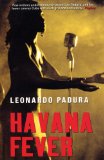Summary | Excerpt | Reviews | Beyond the Book | Readalikes | Genres & Themes | Author Bio

She vanished into the mansion, through a kind of portico erected
on two Tuscan columns of shiny, green-striated black marble, and
the Count regretted the poor state of his knowledge of the now
scattered Creole aristocracy, an ignorance that meant he didn’t know,
couldn’t even imagine, who’d originally owned that marmoreal
edifice, and whether the present occupants were descendants or
mere beneficiaries of a post-revolutionary stampede to safety. That
reception room, with its damp patches, missing plaster and cracked
walls, looked no better than the outside of the house, but retained
an air of solemn elegance and vibrant memories of the huge wealth
that had once slept between those now bereft walls. Flanked by
dangerously crumbling cornices and faded coloured friezes, the
high ceilings must have been the work of master craftsmen, as were
the two large windows that preserved remarkably intact romantic
stained-glass scenes of chivalry, no doubt designed in Europe and
destined to attenuate and colour the strong light from a tropical
summer. In eclectic rather than famous styles, and shabby rather
than broken, the still sturdy furniture also exuded an odour of
decrepitude, while the black-and-white marble tiled floors, patterned
like an out-sized chessboard, gleamed cheerfully and looked freshly
cleaned. On one side of the reception room, two very high doors
mounted with square bevelled mirrors, set in dark wood marquetry,
reflected the desolation between flowery quicksilver blotches. It was
then that the Count grasped what was behind the oddness he’d
experienced on entering the room: there wasn’t a single adornment
or painting, a single visual prop to break the grim void on walls,
tables, shelves or ceilings. He assumed that the noble bone china
dinner services, repoussé silver, chandeliers, cut-glass and canvases
with dark or elaborate still lives that once brought harmony to that
scene, had been sent packing in advance of the books, to address
food shortages – a fate that the library, already flagged as a very
valuable asset, might similarly meet, if he were in luck.
The moment mentioned by the woman turned into a wait of
several minutes which the Count spent smoking, knocking the ash
out of the window, through which he saw the first drops of an
evening shower. When his hostess returned, an older, more ancient looking
man followed in her wake, in urgent need of a shave and,
like his companion, of three square meals a day.
“My brother,” she announced.
“Dionisio Ferrero,” responded the man in a voice that was
younger than his body, as he held out a calloused hand with grimy
fingernails.
“Mario Conde. I . . .”
“My sister has already explained,” he said in the curt tone of a
man used to giving orders, rounding off his remarks with an order
rather than a request: “Come this way.”
Dionisio Ferrero walked towards the doors with bevelled mirrors
and the Count noted that his own appearance, framed in the
reflection between the dark stains, was no better than the skeletal
Ferreros’. The exhaustion in his face after successive rum-sodden,
sleepless nights, and his squalid skinniness gave the impression
that his clothes had outgrown his body. Dionisio pushed the doors
with unexpected vigour and Conde lost sight of himself and his
physiological musings at the same time as he felt a violent searing
pain in his chest, because there before his eyes stood a splendid
array of glass-doored, wooden bookcases, where hundreds,
thousands of dark volumes rested and ascended to the lofty ceiling,
the gold letters of their identities still glinting, neither subdued by
the island’s insidious damp nor exhausted by the passage of time.
Paralysed by that vision, conscious of his breath’s halting
rhythms, Conde wondered whether he’d have the strength, then
ventured three cautious steps forward. When he crossed the
threshold, he realized, in state of total shock, that the quantity
of shelves packed with volumes extended down every side of the
room, covering the roughly thirty-six square yards of wall. It was
at that precise moment of more than justifiable emotion and awe,
that the tumultuous symptoms of his hunch hit him – a feeling
quite distinct from any surprise prompted by books or business,
with the power to suggest that something extraordinary was lurking
there clamouring for his presence.
Excerpted from Havana Fever by Leonardo Padura Copyright © 2009 by Leonardo Padura. Excerpted by permission of Bitter Lemon Press. All rights reserved. No part of this excerpt may be reproduced or reprinted without permission in writing from the publisher
On the whole, human beings want to be good, but not too good and not quite all the time
Click Here to find out who said this, as well as discovering other famous literary quotes!
Your guide toexceptional books
BookBrowse seeks out and recommends the best in contemporary fiction and nonfiction—books that not only engage and entertain but also deepen our understanding of ourselves and the world around us.